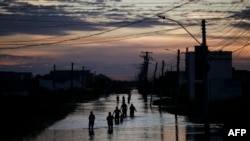Teams raced against the clock Thursday to deliver aid to flood-stricken communities in southern Brazil before the arrival of new storms forecast to batter the region once again.
About 400 municipalities have been affected by the worst natural calamity ever to hit the state of Rio Grande do Sul, with at least 107 people dead and hundreds more injured.
More than 164,000 people have been forced from their homes in the state capital Porto Alegre, a city of some 1.4 million people, and hundreds of other cities and towns.
Many in the region have no access to drinking water or electricity, or even the means to call for help, with telephone and internet services down.
At least 134 people were reported missing and nearly 1.7 million have suffered damage in flooding that government and experts have linked to climate change.
On Thursday, rescuers in boats and on jet skis were traveling streets turned into rivers, looking for people trapped in their homes or those reluctant to leave for fear of looting.
In the town of Canoas outside the state capital, a horse was hauled from a rooftop by rescuers in inflatable boats, according to images on local media.
The state's Guaiba River, which runs through Porto Alegre, reached historic levels this week, and officials have warned five dams were at risk of rupturing.
"The focus is still on rescues ... but we are working very hard on delivering humanitarian aid," Sabrina Ribas, a spokesperson for the civil defense force that handles disaster relief, told journalists.
These efforts may be hindered in the coming days, she added, given warnings of new downpours from Friday to Sunday.
In a sports complex in downtown Porto Alegre, a makeshift shelter accommodated 450 people on mattresses scattered around the floor, as well as a few dozen dogs and a small pig.
"The solidarity is impressive," school director Resplande de Sa, 57, told AFP at a donation center as volunteers sorted through bedding, clothes and diapers.
Several prisons have sought federal assistance after being left without potable water, according to the non-governmental Criminal Justice Network.
At one jail, prisoners had to be moved to higher floors as floodwaters entered the complex.
The disaster has damaged more than 60,000 homes and devastated the economy of the largely agricultural state, which normally supplies more than two-thirds of the rice consumed in Brazil.
The federal government said Thursday it would set aside $10 billion for reconstruction of the region.
And the Inter-American Development Bank pledged $1.1 billion for infrastructure rebuilding, support to businesses and measures to help people keep their jobs.
The Christ the Redeemer statue in Rio de Janeiro was lit up Wednesday night in homage to the victims, with a message appealing for more donations.
Help arrived from outside Brazil as well.
Pope Francis sent $107,000 to help care for evacuees, and tycoon Elon Musk said his Starlink satellite company will donate 1,000 terminals to emergency responders "and make usage for all terminals ... free until the region has recovered."
Only two of Porto Alegre's six water treatment plants were functioning, the mayor's office said earlier this week, and hospitals and shelters were being supplied by tankers.
The federal government, meanwhile, said it would import 200,000 tons of rice to guarantee supplies and preempt price speculation.





